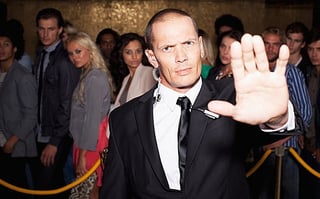The name of the person at the door whose job is to check “people's faces” is a bouncer

The (burly) bouncer at the door allowed people to enter and barred those who couldn't.
Wikipedia describes the position as
A bouncer (also known as a doorman, door supervisor or cooler) is a type of security guard, employed at venues such as bars, nightclubs, stripclubs or concerts. A bouncer's duties are to provide security, check legal age, to refuse entry for intoxicated persons, and to deal with aggressive behavior or non-compliance with statutory or establishment rules.
In 1875, the term bounce was used as a verb to signify the act of physically throwing someone out of an establishment or venue. From the same Wikipedia page, there is an excerpt from the novel The Young Outlaw, by Horatio Alger, Jr.
"Here, Peter, you waited on this young man, didn't you?" "Yes, sir." "He hasn't paid for his breakfast, and pretends he hasn't got any money. Bounce him!" If Sam was ignorant of the meaning of the word 'bounce,' he was soon enlightened. The waiter seized him by the collar, before he knew what was going to happen, pushed him to the door, and then, lifting his foot by a well-directed kick, landed him across the sidewalk into the street. This proceeding was followed by derisive laughter from the other waiters who had gathered near the door, and it was echoed by two street urchins outside, who witnessed Sam's ignominious exit from the restaurant. Sam staggered from the force of the bouncing, and felt disgraced and humiliated to think that the waiter who had been so respectful and attentive should have inflicted upon him such an indignity, which he had no power to resent.
From Google books, the word allow is used several times, as well as the term scrutinize, in the Bouncer Training Guide, by the National Nightclub Security Council. The OP's sample sentence would then read,
The burly guy was assigned to scrutinize people at the entrance.

